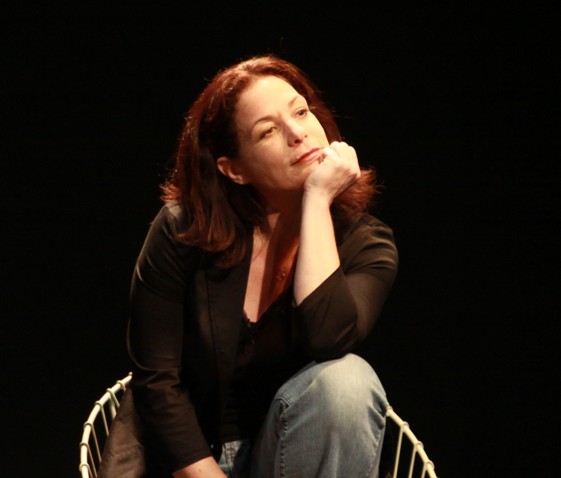
War can break out in the middle of anyone’s childhood, transforming it forever. There are two sirens: the air-raid siren that signals war and the siren that commemorates the fallen. Many children already know how to distinguish between the two, because they have heard both sirens. When the siren sounds on Yom Hazikaron, this day of remembrance, the silence has a presence stronger than words. The narrative of loss is a narrative of absence, how does one put it into words?
Two sisters, Hagit Bodankin and Osnat Zibil, have wrought a moving and thought provoking work of art from their own experience of loss. “The Exodus from Egypt” written by Bodankin, directed by Vidi Bilu and performed by Zibil in the Theatronetto Festival 2010 during the recent Passover holiday, tells the story of Nurit, who is ten years old at the outbreak of the Yom Kippur war. Relying on minimal props and costume, a thirty-something woman in ordinary clothes stands in front of the audience and speaks in the words of a girl just on the brink of knowledge.
“The Exodus from Egypt” recreates the world of Nurit’s childhood with unsparing precision and honest detail. It is a reminder of the many ways in which the ephemera of daily life is entangled in history, creating memory and identity, both individual and collective. With a few sure strokes a village in Israel of the early 70s comes to life – the Yom Kippur that was just another work day in the fields, sweating in the October sun, the intimacy and little tensions between neighbors, listening to Elvis on a turntable, collecting pretty paper napkins and a vague sense of “that” war long ago. Nurit’s story begins with the moment she is made to swallow a “small white pill” before being told by a neighbor that her father is missing in action. From that moment on, the play is the story of searching – for Nurit’s father, for the truth, for comfort.
Zibil’s portrayal of ten year old Nurit appears artless and natural, yet both play and performance are meaningfully thought-out and structured. Zivil received an honorable mention from the Theatronetto. The judges said, “Zibil expresses an emotional force that takes us back to the shock that Israeli society lived through in the Yom Kippur war and its aftermath. The actresses’ moving performance transforms her personal story to one that is universal.” The play conveys not only the heartache of war, but the heartache of everyday life, the distance between people and between our desires – simple as they may appear to be, and their fulfillment.
As this day comes to a close, and the nation turns out to celebrate, let our hearts and minds linger for a moment on those for whom Remembrance Day is not just one day, it is every day. It is the Jewish custom to wish those in mourning: May you know no more sorrow. It is our responsibility to bring about that time, when families will no longer know the sorrow of war.
AYELET DEKEL





